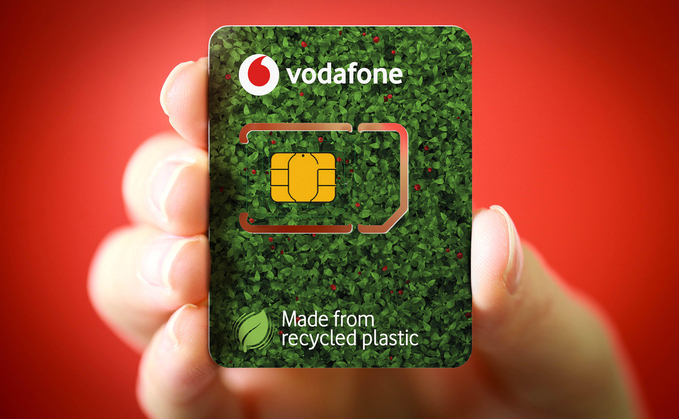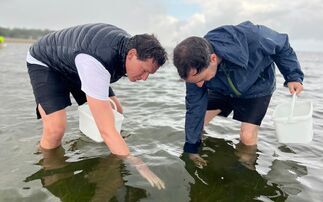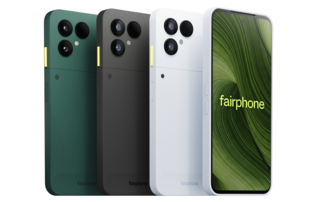
Vodafone 'Eco-SIMs' made from 100 per cent recycled plastic
Partner Insight: First held in 1970, Earth Day has been around for over fifty years. But it’s more than just another annual calendar date, as Nicki Lyons, Vodafone UK's chief corporate affairs & sustainability officer, explores
Starting as a US-wide forum in reaction to a Californian oil spill, the inaugural Earth Day saw more than 20 million people take to the streets in peaceful protest. In fact, even today, it remains one of the largest single-day protests in human history.
This year, the theme is ‘Planet vs Plastics'. A relevant topic for companies and consumers alike, and one that touches on a widely discussed term in today's environmental discourse: the circular economy.
Neatly tying together the natural world and the business world, the concept of a circular economy raises various questions for businesses, particularly around how goods are designed, developed and, ultimately consumed by customers.
Of course, balancing this economy is the tricky part. Which is why, for a brand like Vodafone UK, it's vital we constantly review and refine our own designs – of products, services and processes.
All with the aim of meeting the three key tenets of a circular economy: eliminating waste; improving the lifecycle of devices; and supporting nature and the communities we operate in.
1. Remove: Eliminating waste and pollution
The first step in creating a circular economy – cutting off waste at the source – is simple in theory, though often more difficult in practice.
For brands, this means designing out any negative impacts from the start. Which can be challenging given that many products have a long legacy of being made in a certain, often inefficient, way.
Innovation, therefore, is key. Given that SIM cards play a big role in our business, this is one area in which we are taking meaningful steps to remove unnecessary plastic waste from our own chain.
The first was to reduce the size of our plastic SIM card holders by half. Since 2020, this has been saving 340 tonnes of plastic a year. The second was to roll out SIM cards made from 100 per cent recycled plastic. These ‘Eco-SIMs', which were first released in 2022, save an additional 1,280 tonnes of CO2 a year.
Finally, we are gradually introducing eSIMs to our customers. Effectively a tiny chip pre-installed in your device, eSIMs negate the need for any physical SIM card entirely.
2. Reuse: Circulating products and materials
If you can't avoid a certain material being used, the next best step is to ensure that material is reused as much as possible. For this to happen, products should be designed with durability – and a longer lifecycle – in mind. Two things that obviously benefit customers in the process.
In the telco space, much of this centres on the phones themselves. Which is why refurbished handsets are such a hot topic.
In fact, here at Vodafone, we've seen sales of refurbished mobile devices increase by almost 83 per cent in just the past year*. Meanwhile, Vodafone's business division has also seen a 175 per cent year-on-year increase in the number of refurbished handsets it sells, suggesting individuals and small businesses alike are becoming more conscious of their sustainability credentials.
And for good reason too given that, if 79 per cent of Brits switched to a refurbished device in 2024, 63,750,000kg carbon could be saved. That would equate to enough power for 88,174 UK family homes for a full year**.
But refurbished devices aren't just a win for direct customers. They also allow us to support the social causes that we care about most. Our Great British Tech Appeal, for instance, has helped us collect more than 20,000 devices, ensuring they receive a second life by supporting those who have been excluded by the digital divide.
Likewise, our Device Lifecycle Management programme gives businesses the opportunity to make the right kind of impact – both environmentally and socially – by having their corporate devices redeployed and refurbished. All while supporting wildlife and community projects in Africa.
Alongside this sits our network equipment waste, 99.8 per cent of which we reuse, resell or recycle in the UK. Simply by reusing equipment in FY23 alone, we managed to avoid an estimated 1,466 tonnes of carbon dioxide equivalent (CO2e), while recycling equipment that could not be repurposed.
3. Regenerate: Supporting natural processes
The final principle of a circular economy is to regenerate nature. While this may seem a straightforward task, it can be the most difficult one for companies that don't have a direct link to the natural world.
The key here is for brands to consider how, through their products and services, they can design for the future – with the environment in mind. In turn, contributing to a brighter outlook for customers and businesses alike.
While our own network powers the nation's connectivity, we also recognise that this brings its environmental impact. That's why we are not only committed to recycling and reusing our network equipment, but are actively identifying biodiversity hotspots that we can support through these very same networks.
Our Internet of Things (IoT) tech is helping Defra and Forest Research understand UK forests, with sensors used to measure tree growth, air and soil temperature, humidity and soil moisture content. Likewise, alongside Extreme E, it is working to protect Atlantic salmon from the effects of evolving weather patterns.
Meanwhile, our recent research into 5G Standalone has revealed the huge impact a comprehensive rollout could have on everything from the power we generate to the food we eat – contributing to lower emissions as well as an improved customer experience.
Coming full circle
Just as the initial Earth Day inspired millions to actively support the cause, the last piece in today's circular economy puzzle remains consumer buy in.
That's why all our actions in this space are underpinned by asking one simple question: "how does this benefit our customers?"
Thankfully, between better services, more affordable products and social good initiatives, that's a question we're becoming much better at answering.
Stay up to date with the latest news from Vodafone by following us on LinkedIn and Twitter/X, as well as signing up for News Centre website notifications.
Nicki Lyons is chief corporate affairs & sustainability officer at Vodafone UK.
This article is sponsored by Vodafone.
------
* Based on Vodafone increase from FY23 refurbished phone sales to FY24 refurbished phone sales.
** Based on the equation below:
- 38 per cent of Brits will consider purchasing a new phone this year – 38 per cent of 67 million (ONS) = 25.5 million.
- If 50 per cent of these people purchase refurbished – 25.5 million / two = 12.75 million.
- Saving of 50kg (VF data) when purchasing a refurbished device - 12,750,000 * 50 = 63,750,000kg CO2.
- A three-four bedroom home in the UK uses on average 3100 kWh of electricity per year. If the source is regular grid electricity, the CO2 emissions are 723 kg.
- 63,750,000 / 723kg = CO2 saving could power 88,174 three-four bedroom houses for a year.







